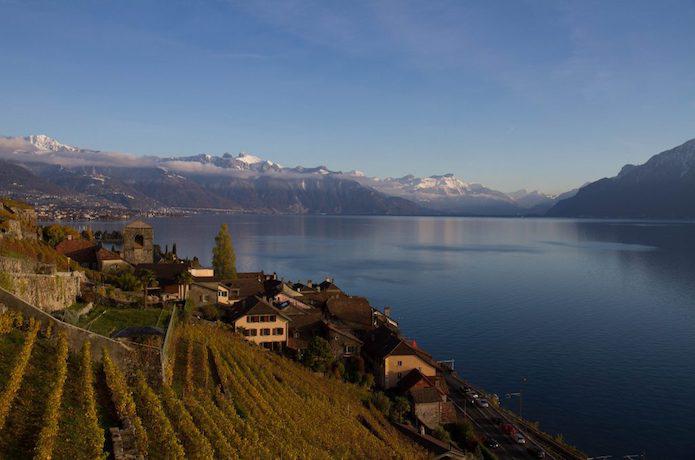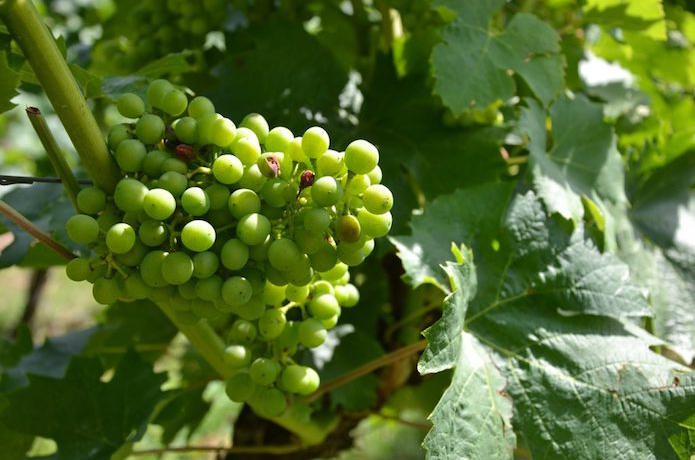A Wine Lover's Guide to Switzerland
- Friday 16 June 2017
Wine isn't what Switzerland is famous for, but that doesn't mean it can't make a good quality bottle or two. While it is made all over the country, most of the wine making takes place in the French speaking cantons but intriguingly, most of Switzerland's wine that is exported, a tiny percentage goes to Germany.
The wine regions
Switzerland’s 26 cantons divide 15,000 hectares (around 0.2% of Switzerland’s surface area) of vineyards between them. Valais is the largest producer of wine (33%) by quite a margin and is home to over 100km of vineyards which follow the course of the Rhône.
Vaud is the second largest producer (25%) and where you’ll find the iconic Lavaux vineyards that stretch along the shore of Lake Geneva for over 30kms. It’s also a UNESCO cultural world heritage site as its current vine terraces can be traced back until at least the 11th century. The grapes of Lavaux are said to be blessed with “three suns”. The first is the sun itself, the second is the heat that eminates from the stone terraces and the third is the reflection from the lake.
Geneva produces around 10% of Switzerland’s wines. As you exit the city, you can find yourself surrounded by vineyards.
Ticino is the Italian part of Switzerland that is regularly bathed in sunshine, making it a great area for wine-making, yet it only produces around 7% of the country’s total.
The rest of Switzerland’s wines (around 25%) are spread out across the German speaking cantons and the Three Lakes area of Lake Neuchâtel, Lake Biel and Lake Morat.
Which grapes are grown?
According to Swisswine.ch, over 200 different varieties of grape are grown in Switzerland. Pinot Noir, Chasselas, Gamay and Merlot are the most widely grown, making up 72% of total production. Although food&wine.com has its own best Swiss wine list which disagrees. Most Swiss wines are unknown to the outside world, so it’s best to dive right in and have a tasting session of your own, for research purposes, of course.
The Best Swiss wines
With Swiss wine being a relatively unexplored area of the market, it is hard to pin point the best available as they are so varied between each of the cantons. According to the Best of Swiss Wine awards for 2017, the top five Swiss wines were: Gamaret/Garanoir Zürichsee, Saliser Grande Selection, Chardonnay Barrique, Fläscher Pinot Noir Alte Reben and the Fläscher Pinot Noir Barrique. Although food&wine.com has its own best Swiss wine list, which disagrees with this one.
Best wine for fondue
The question that is on everyone’s lips. It’s well known that having a tipple of wine helps with digesting a cheese heavy meal like fondue. A dry wine is recommended as the perfect accompaniment to your meal, Sauvignon Blanc is one possible option.
Where to sample the wine
Wine tastings are available across the country, but the best time above all is during the locally famous caves ouvertes. Every year during Spring, Early Summer and Autumn, Switzerland’s wine makers throw open their cellars and offer tastings for the price of a single glass (usually between 10 to 20 CHF). If you find yourself in the German speaking cantons, don’t fret as the tradition is also marked but is just known as offene keller. Lavaux’s equally famous wine tour is one way to sample the flavours of Vaud’s many wine makers that have cafés, cellars and restaurants, where you can sample their products.
How to say cheers
The Swiss don’t do cheers like everyone else. You have to look your drinking partner directly in the eye when you clink glasses, which can be a little off putting. Depending on where you are in the country you’ll drink to salute, santé or proscht.







